Introduction
Did you know that the Cardigan Welsh Corgi, often mistaken for its cousin, the Pembroke Welsh Corgi, boasts a rich history that dates back centuries, with a lineage intertwined with folklore and royalty? This captivating breed has captured the hearts of dog enthusiasts worldwide, and in this comprehensive guide, we’ll delve into every aspect of the Cardigan Welsh Corgi, from their unique characteristics to their care requirements.
The purpose of this article is to provide you with an in-depth understanding of the Cardigan Welsh Corgi dog breed. Whether you’re a prospective dog owner, a longtime Corgi enthusiast, or simply curious about these charming little canines, you’ll find all the information you need right here. We’ll cover their history, appearance, temperament, intelligence, exercise needs, grooming requirements, and much more.
While there’s no shortage of information about dogs on the internet, the Cardigan Welsh Corgi deserves a spotlight of its own. This breed is unique, and we aim to offer the most up-to-date and comprehensive resource available. So, if you’ve been searching for a reliable source that combines detailed insights with the latest information about Cardigan Welsh Corgis, you’re in the right place.

Cardigan Welsh Corgi Breed Overview
To begin our exploration of this enchanting breed, let’s start by creating a detailed table that provides essential information about Cardigan Welsh Corgis:
| Field | Information about the Cardigan Welsh Corgi |
|---|---|
| Height | About 10.5 to 12.5 inches (26.5 to 31.5 cm) |
| Weight | Approximately 25 to 38 pounds (11 to 17 kg) |
| Life Span | 12 to 15 years |
| Good with | Children, other pets |
| Temperament | Intelligent, affectionate, alert |
| Intelligence | Very high |
| Shedding Amount | Moderate |
| Grooming | Regular brushing and occasional baths |
| Exercise Needs | Moderate to high |
| Energy Level | Energetic and playful |
| Barking Level | Moderate |
| Drool Amount | Minimal |
| Coat Length/Texture | Medium-length, weather-resistant double coat |
| Colors | Variety of coat colors, including red, sable, black, and blue merle |
| Patterns | Typically have white markings, often with “points” on the legs, chest, and face |
Now that we have a comprehensive overview of the Cardigan Welsh Corgi’s key characteristics, let’s dive deeper into each of these aspects in the following sections of this guide. Whether you’re considering adopting a Cardigan Welsh Corgi or are simply fascinated by this remarkable breed, you’ll find all the information you need to know right here.
Table of Contents
2. Breed History and Origin
Exploring Their Roots
The Cardigan Welsh Corgi, often referred to simply as the “Cardigan Corgi,” boasts a rich and fascinating history that spans centuries. This breed’s roots can be traced back to Wales, where it was originally bred for herding cattle and sheep. Let’s dive into the historical development of the Cardigan Welsh Corgi and discover the breeds that played a vital role in shaping its unique characteristics.
Origins in Wales
Cardigan Welsh Corgis hail from the rugged and picturesque region of Cardiganshire in Wales. Their history dates back to at least a thousand years, making them one of the oldest dog breeds in the British Isles. The name “Corgi” itself is derived from the Welsh words “cor,” meaning dwarf, and “ci,” meaning dog, which aptly describes their stature.
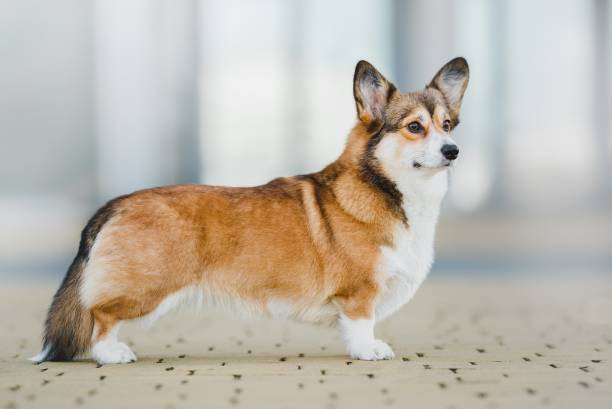
Breeds That Shaped the Cardigan Welsh Corgi
To understand the origins of the Cardigan Corgi, we must delve into the breeds that contributed to its development. The Cardigan Welsh Corgi shares its ancestry with several European breeds, most notably:
- Swedish Vallhund: This breed, also known as the Swedish Cattle Dog, shares a striking resemblance with the Cardigan Corgi. It’s believed that the Swedish Vallhund’s ancestors accompanied Vikings on their travels, eventually making their way to Wales.
- Dachshund: The long body and short legs of the Dachshund are evident in the Cardigan Corgi as well. It’s possible that Dachshunds were introduced to the breed’s bloodline, contributing to their distinctive physique.
- Trollhund: Although now extinct, the Trollhund, a Swedish breed, is said to have played a role in the Cardigan Corgi’s lineage. This ancient breed shares the Cardigan’s short legs and long body.
- Basset Hound: Some theories suggest that Basset Hounds, known for their excellent tracking abilities, may have influenced the Cardigan Welsh Corgi’s strong herding instincts.
Notable Traits
Cardigan Welsh Corgis possess a combination of traits that set them apart from other breeds, both in history and today. These distinctive characteristics have endeared them to generations of dog lovers:
- Tail: One of the most recognizable features of the Cardigan Corgi is its long and bushy tail, often likened to a “fox tail.” In contrast, the Pembroke Corgi, its close relative, typically has a shorter tail.
- Ears: Cardigans are known for their large, expressive ears that stand erect. These ears were not only charming but also served a practical purpose in their herding duties, allowing them to hear and react to commands from their human handlers.
- Coat: Their double coat, consisting of a weather-resistant outer layer and a soft, insulating undercoat, made them well-suited to the rugged terrain and unpredictable weather conditions of Wales.
- Intelligence: Cardigan Welsh Corgis have always been renowned for their intelligence and problem-solving abilities. These traits made them exceptional herding dogs, as they could anticipate the movements of cattle and make quick decisions.
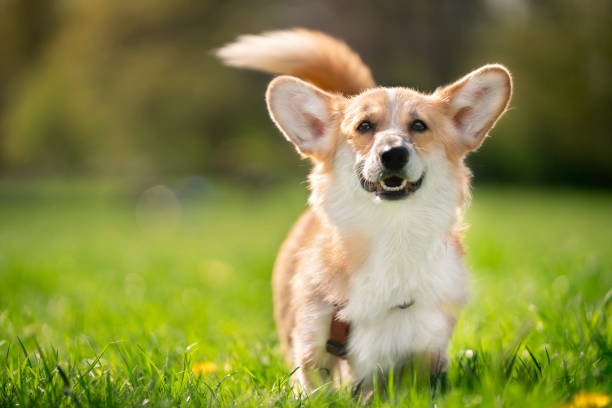
Relevance of Origin
Understanding the historical origins of the Cardigan Welsh Corgi provides valuable insights into the breed’s characteristics and behaviors today. Their heritage as herding dogs in Wales has left an indelible mark on their temperament and instincts. Here’s how their origin continues to influence the breed:
- Herding Instinct: The Cardigan Corgi’s strong herding instinct, a trait inherited from their ancestors, remains prevalent in modern-day individuals. They may exhibit herding behaviors, such as nipping at heels or trying to corral other animals or even people.
- Alertness: The breed’s history as a vigilant herder has made them exceptionally alert and attentive. Cardigans are quick to notice changes in their environment and will often sound the alarm when something seems amiss.
- Adaptability: Their adaptability to different terrains and weather conditions, honed over centuries in the Welsh countryside, makes them resilient and well-suited to various living environments.
In summary, the Cardigan Welsh Corgi’s history is a tapestry woven with threads of ancient herding traditions and the influence of several European breeds. Their distinctive traits and strong sense of purpose continue to make them beloved companions and reliable working dogs today. In the following sections, we’ll delve deeper into the Cardigan Corgi’s appearance, temperament, care requirements, and more, providing you with a comprehensive guide to this remarkable breed.
3. Understanding the Cardigan Welsh Corgi Breed’s Traits
Physical Characteristics
Cardigan Welsh Corgis possess a unique set of physical characteristics that make them easily distinguishable from other dog breeds. These charming canines are known for their compact yet sturdy build, and here’s a closer look at their physical attributes:
Size
Cardigans are a small to medium-sized breed, with the following typical measurements:
- Height: Approximately 10.5 to 12.5 inches (26.5 to 31.5 cm) at the shoulder.
- Weight: Generally ranging from 25 to 38 pounds (11 to 17 kg).
Coat Type
Cardigan Welsh Corgis have a distinctive double coat designed to protect them from the Welsh climate. Their coat consists of:
- Outer Coat: The outer layer is weather-resistant and dense, with a slightly coarse texture.
- Undercoat: Beneath the outer layer lies a soft and insulating undercoat, providing warmth.
Color and Distinguishing Features
One of the intriguing aspects of Cardigans is their coat color diversity. They come in various shades, including:
- Red: Solid red is a common color.
- Sable: This color features a mixture of red and black hairs.
- Black: Some Cardigans have a solid black coat.
- Blue Merle: A striking coloration with a mottled or marbled appearance of gray and black, often with white markings.
In addition to their coat colors, Cardigan Welsh Corgis often have distinct white markings, especially on their legs, chest, and face. These markings, known as “points,” further enhance their unique appearance. Another notable feature is their long, bushy tail, which adds to their charm.

Temperament Overview
Cardigan Welsh Corgis are renowned for their distinctive temperament, making them a beloved choice for families and individuals alike. Let’s explore their temperament in detail:
Suitability as Family Pets
Cardigans are excellent family dogs, known for their affectionate nature and loyalty. They tend to form strong bonds with their human family members and often enjoy being part of family activities.

Interaction with Children
Cardigan Welsh Corgis are typically good with children. Their herding instincts may lead them to try to “herd” children by gently nipping at their heels, but this behavior is rarely aggressive. Nonetheless, it’s essential to teach both the dog and children appropriate behavior and ensure that interactions are supervised.
Compatibility with Other Pets
Cardigans can get along well with other pets, especially if they are introduced and socialized from a young age. Their friendly and adaptable nature often makes them a good fit for multi-pet households.
Environment Needs
Space Requirements
Cardigan Welsh Corgis are adaptable and can thrive in various living environments. While they are small in size, they have plenty of energy and may benefit from access to a fenced yard where they can run and play. However, they can also adapt to apartment living, provided they receive regular exercise.
Temperature Considerations
Their double coat makes Cardigans well-suited to cooler climates. They can tolerate cold weather comfortably but may struggle in extreme heat. During hot weather, it’s essential to provide shade and plenty of water to keep them comfortable.
Training and Socialization
Trainability
Cardigan Welsh Corgis are highly intelligent dogs, which makes them relatively easy to train. They are eager to please and often excel in obedience training. However, their strong will and independence may lead to moments of stubbornness, so consistent and positive reinforcement-based training methods work best.
Importance of Socialization
Proper socialization is crucial for Cardigans. Introducing them to various people, environments, and situations from a young age can help ensure they grow up to be well-adjusted and confident dogs. Socialization can also reduce any tendencies toward shyness or fearfulness.
In summary, Cardigan Welsh Corgis possess a distinctive set of physical characteristics that set them apart from other breeds. Their temperament makes them wonderful family pets, especially when raised with children and other animals. While they adapt well to various living environments, they thrive in homes where they receive ample love, exercise, and mental stimulation. Training and socialization are essential to harness their intelligence and ensure they grow into well-behaved companions. In the following sections, we’ll explore their care requirements, exercise needs, and health considerations in greater detail, providing you with a comprehensive guide to the Cardigan Welsh Corgi breed.

4. Health Considerations and Care
Cardigan Welsh Corgis are generally robust and healthy dogs, but like all breeds, they can be prone to specific health issues. It’s essential to be aware of these potential problems and take proactive measures to ensure the well-being of your furry companion.
Common Health Issues
Cardigan Welsh Corgis may be susceptible to several health conditions, including:
1. Hip Dysplasia
- Hip dysplasia is a common concern in Corgis due to their unique body structure. Regular exercise, a balanced diet, and maintaining a healthy weight can help reduce the risk.
2. Progressive Retinal Atrophy (PRA)
- PRA is an inherited eye condition that can lead to blindness. Regular eye exams by a veterinarian can help detect PRA early, allowing for possible treatment.
3. Degenerative Myelopathy
- This is a progressive disease of the spinal cord that can result in hind leg weakness and paralysis. While there’s no cure, physical therapy and mobility aids can improve the quality of life for affected dogs.
4. Obesity
- Cardigans love to eat, but their short legs and long body make them prone to obesity. Proper portion control and regular exercise are crucial for weight management.
5. Intervertebral Disc Disease (IVDD)
- IVDD can cause back pain and paralysis due to spinal disc degeneration. Preventative measures include maintaining a healthy weight and avoiding activities that put excessive strain on the spine.
6. Bloat (Gastric Torsion)
- Bloat is a life-threatening condition that can affect deep-chested breeds like the Cardigan Corgi. Feeding smaller, more frequent meals and avoiding strenuous exercise immediately after eating can help reduce the risk.
7. Allergies
- Cardigans can be prone to skin allergies. If your dog exhibits itching, redness, or other skin issues, consult your vet to determine potential allergens and treatment options.
It’s crucial to work closely with a veterinarian who is familiar with the breed to monitor your Cardigan’s health regularly. Routine check-ups and early detection of any health issues can significantly improve the prognosis and quality of life for your dog.
Lifespan and Longevity
On average, Cardigan Welsh Corgis have a lifespan of 12 to 15 years. To promote a longer and healthier life for your furry friend, consider the following tips:
- Regular Veterinary Check-ups: Schedule annual check-ups and vaccinations, and discuss any concerns with your vet promptly.
- Balanced Diet: Feed your Cardigan a high-quality dog food that meets their specific nutritional needs. Consult your vet for guidance on portion control and feeding schedules.
- Exercise and Mental Stimulation: Keep your Cardigan active with daily walks, playtime, and mental exercises like puzzle toys. A stimulated mind and body contribute to overall well-being.
- Maintain a Healthy Weight: Obesity is a common health issue in Corgis, which can lead to various health problems. Monitor your dog’s weight and adjust their diet and exercise routine as needed.
- Dental Care: Dental health is crucial. Brush your Cardigan’s teeth regularly and provide dental chews or toys to reduce plaque and tartar buildup.
- Hydration: Ensure your dog has access to clean water at all times, especially during warm weather.
Diet and Nutrition
Cardigan Welsh Corgis have specific dietary needs to support their overall health and prevent obesity. Here are some guidelines for their diet and nutrition:
- High-Quality Dog Food: Choose a dog food formulated for small to medium-sized breeds, and check that it meets AAFCO (Association of American Feed Control Officials) standards for complete and balanced nutrition.
- Portion Control: Measure your dog’s food portions to prevent overfeeding. Follow the recommended serving size on the dog food packaging or consult your veterinarian for guidance.
- Feeding Schedule: Establish a consistent feeding schedule, typically two meals a day for adult Cardigans. Puppies may require more frequent feeding.
- Avoid Table Scraps: Resist the temptation to feed your dog from the table, as human food can be unhealthy and lead to weight gain.
Exercise and Activity
Cardigans are energetic and intelligent dogs that require regular exercise and mental stimulation. Here’s how to ensure they stay active and engaged:
- Daily Walks: Take your Cardigan for daily walks to provide physical exercise and mental stimulation. A brisk 30-minute walk can do wonders for their well-being.
- Playtime: Engage in interactive play sessions with toys like fetch, tug-of-war, and puzzle toys that challenge their problem-solving skills.
- Obedience Training: Mental exercises are just as crucial as physical ones. Train your Cardigan with obedience commands and tricks to keep their mind active.
- Socialization: Expose your dog to various people, animals, and environments from a young age. This helps prevent behavioral issues and ensures they are well-adjusted.
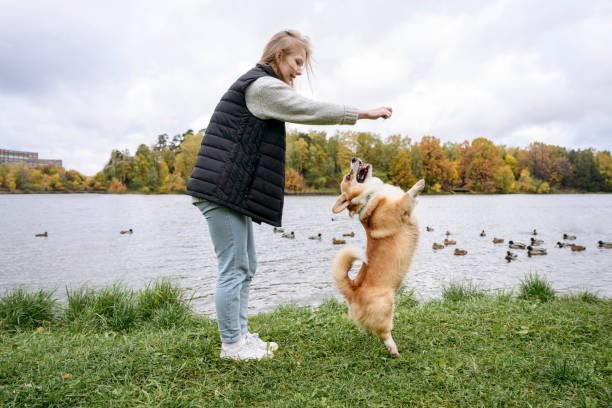
Grooming and Maintenance
Proper grooming is essential to keep your Cardigan Welsh Corgi healthy and comfortable:
- Coat Care: Brush your Cardigan’s double coat regularly to remove loose hair and prevent matting. Pay extra attention during shedding seasons.
- Ear Cleaning: Check and clean their ears regularly to prevent wax buildup and infections.
- Eye Cleaning: Wipe around their eyes as needed to prevent tear staining.
- Dental Care: Brush your dog’s teeth regularly to prevent dental issues. Dental chews and toys can also help reduce plaque.
- Shedding: Be prepared for shedding, especially during seasonal changes. Regular brushing can help manage loose hair.
By following these guidelines for health and care, you can ensure that your Cardigan Welsh Corgi enjoys a happy, healthy, and fulfilling life as a cherished member of your family. Remember that each dog is unique, so consult with your veterinarian to tailor a care plan specifically to your Cardigan’s needs.

5. Choosing and Adopting a Cardigan Welsh Corgi Dog Breed
Reasons for Adoption
Adopting a Cardigan Welsh Corgi can be a fulfilling and rewarding experience for both you and your future canine companion. There are several compelling reasons to consider adopting this breed:
1. Rescue and Second Chances
- By adopting a Cardigan Welsh Corgi, you provide a loving home to a dog in need. Many Cardigans end up in shelters or rescue organizations due to various reasons, such as changes in their owners’ circumstances or behavioral issues. Giving them a second chance at a happy life is a noble endeavor.
2. Loving and Loyal Companions
- Cardigans are known for their loyalty and affectionate nature. When you adopt one, you’re gaining a loyal companion who will be by your side through thick and thin.
3. Health Screening
- Many rescue organizations conduct health screenings and evaluations before putting dogs up for adoption. This means you can adopt a Cardigan with a better understanding of their health status.
4. Cost-Effective
- Adoption fees are often more affordable than purchasing a Cardigan Welsh Corgi from a breeder. Plus, these fees typically include vaccinations, spaying or neutering, and sometimes microchipping.
Research and Preparation
Before you decide to adopt a Cardigan Welsh Corgi, it’s essential to research and prepare adequately to ensure a smooth transition for both you and your new furry friend. Here’s what you need to consider:
Understanding Breed-Specific Needs
- Cardigans have unique characteristics and requirements. Research their temperament, exercise needs, grooming demands, and any breed-specific traits that might influence your decision.
Financial Responsibilities
- Owning a dog comes with financial responsibilities, including food, grooming, veterinary care, and potential emergencies. Ensure you have the resources to provide proper care.
Training and Socialization
- Cardigans thrive on positive reinforcement training and early socialization. Are you prepared to invest time and effort into training and socializing your dog?
Space and Exercise
- Cardigans are active dogs that require regular exercise. Do you have enough space and time to meet their exercise needs?
Adoption Process
Adopting a Cardigan Welsh Corgi involves several steps, which may vary depending on the rescue organization or shelter. Here’s an overview of the typical adoption process:
1. Research and Find Reputable Organizations
- Start by researching and identifying reputable rescue organizations or breed-specific rescues that specialize in Cardigan Welsh Corgis. Check their websites and reviews to ensure they have a good reputation.
2. Submit an Application
- Once you’ve found a suitable organization, you’ll need to fill out an adoption application. This form will typically ask about your living situation, experience with dogs, and your expectations as a dog owner.
3. Home Visit
- Some organizations may require a home visit to assess whether your living environment is suitable for a Cardigan. This visit helps ensure the safety and well-being of the dog.
4. Meet the Dog
- If your application is approved and you pass the home visit, you’ll have the opportunity to meet potential Cardigan Welsh Corgis available for adoption. Spend time with them to see if there’s a connection.
5. Adoption Fee
- There is usually an adoption fee, which can vary depending on the organization and the dog’s age. This fee often covers vaccinations, spaying or neutering, and other initial medical expenses.
6. Complete the Adoption
- Once you’ve selected a Cardigan and paid the adoption fee, you’ll complete the adoption process. The organization will provide you with the necessary paperwork, including medical records.
Breeding and Ethical Considerations
While adoption is a wonderful way to provide a loving home to a Cardigan Welsh Corgi, it’s essential to be aware of responsible breeding practices and ethical considerations:
Responsible Breeding Practices
- If you choose to purchase a Cardigan from a breeder, make sure they follow responsible breeding practices. Reputable breeders prioritize the health and well-being of their dogs and conduct health screenings to minimize genetic issues.
Health Screening
- Ensure that the breeder you choose conducts thorough health screenings for conditions that are common in Cardigans, such as hip dysplasia and eye disorders.
Genetic Diversity
- Ethical breeders work to maintain genetic diversity within the breed, reducing the risk of inherited health problems.
Adoption vs. Purchase
- Weigh the pros and cons of adoption versus purchasing from a breeder carefully. Both options have their merits, but adopting can be a compassionate choice.
In conclusion, adopting a Cardigan Welsh Corgi is a wonderful way to provide a loving home to a dog in need and experience the joy of having a loyal and affectionate companion. However, it’s crucial to research, prepare, and consider your options carefully to ensure that both you and your new furry friend have a happy and fulfilling life together. Whether you choose to adopt or purchase, prioritize the well-being of the Cardigan and support responsible breeding practices.
6. Popularity and Recognition
Current Popularity
The Cardigan Welsh Corgi, with its charming appearance and endearing personality, has maintained a consistent level of popularity over the years. While they may not be as widely recognized as some other breeds, they have a dedicated fan base, and their appeal continues to grow. Here’s a look at the breed’s current popularity:
Steady Demand
- Cardigan Welsh Corgis are in demand among dog lovers seeking a loyal and affectionate companion with a unique look. Their distinctive features, including those expressive ears and bushy tails, draw admirers from all walks of life.
Internet Fame
- Thanks to the power of social media, Cardigans have gained a significant online presence. Many owners love sharing photos and videos of their Corgis, showcasing their adorable antics and charming personalities. This online exposure has contributed to the breed’s popularity.
Trending as Family Pets
- Cardigan Welsh Corgis are often seen as excellent family pets due to their gentle nature and compatibility with children. Families looking for a smaller yet robust breed that gets along well with kids are increasingly turning to the Cardigan.
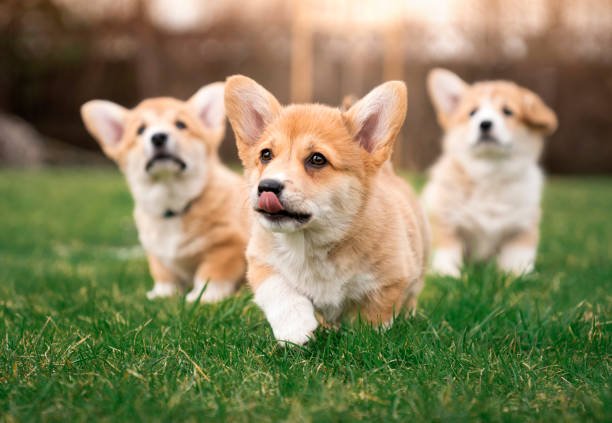
Breed Recognition
The Cardigan Welsh Corgi has earned recognition from various kennel clubs and breed organizations around the world, solidifying its place in the world of purebred dogs.
American Kennel Club (AKC)
- The Cardigan Welsh Corgi has been recognized by the American Kennel Club (AKC) since 1935. It is classified as a member of the Herding Group, highlighting its historical role as a herding and working dog.
The Kennel Club (UK)
- In the United Kingdom, The Kennel Club recognizes the Cardigan Welsh Corgi as a distinct breed. It is also grouped under the Herding category.
Fédération Cynologique Internationale (FCI)
- The Fédération Cynologique Internationale, the international canine organization, also recognizes the Cardigan Welsh Corgi and provides breed standards to maintain its integrity worldwide.
Breed Organizations
- Apart from official kennel clubs, there are numerous Cardigan Welsh Corgi breed organizations and clubs dedicated to promoting and preserving the breed. These groups often organize events, provide resources, and support research and rescue efforts.
Notable Breed Varieties
Unlike some breeds with distinct varieties or subtypes, the Cardigan Welsh Corgi is relatively uniform in appearance and temperament. However, there are subtle variations based on geography and breeding practices. Here are a couple of notable distinctions:
1. American vs. Welsh Cardigan Welsh Corgi
- While both American and Welsh Cardigans share the same breed standard and overall appearance, some enthusiasts note subtle differences. American Cardigans tend to be slightly taller and more streamlined, with a focus on agility, while Welsh Cardigans often have a slightly stockier build and are prized for their herding abilities.
2. Coat Color Variations
- Cardigan Welsh Corgis come in a variety of coat colors, including red, sable, black, and blue merle. Each of these colors can have unique patterns and markings, making each Cardigan truly one-of-a-kind.
In summary, the Cardigan Welsh Corgi may not top the charts as one of the most popular breeds globally, but it enjoys steady popularity and recognition among dog enthusiasts, particularly those who appreciate their unique charm and affectionate nature. With recognition from major kennel clubs and a growing presence on social media, Cardigans continue to capture the hearts of dog lovers around the world. Despite subtle variations in appearance and geographical origins, the breed maintains its timeless appeal and enduring popularity.
7. Exercise and Activity Recommendations
Keeping your Cardigan Welsh Corgi physically and mentally stimulated is crucial for their well-being. These intelligent and energetic dogs require regular exercise and activities to stay happy and healthy. Here’s a comprehensive guide to meeting their exercise needs:
Exercise Plan
Cardigan Welsh Corgis are an active breed, and providing them with the right amount and type of exercise is essential to prevent boredom and maintain their overall health. Here’s a detailed exercise plan:
Daily Walks
- Duration: Aim for at least 30 to 45 minutes of brisk walking each day.
- Frequency: Daily walks are vital for Cardigans to burn off energy and explore their environment.
- Variety: Change up your walking route occasionally to keep things interesting for your dog.
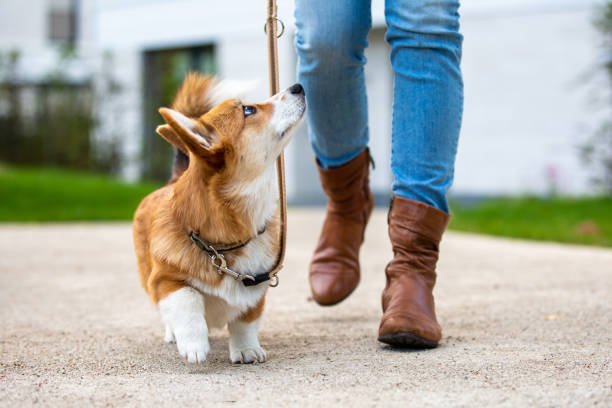
Playtime
- Duration: Set aside 20 to 30 minutes for interactive play sessions.
- Frequency: Engage in playtime at least once a day to mentally stimulate your Cardigan.
- Toys: Toys like tennis balls, rope toys, and puzzle toys can keep them engaged.
Agility Training
- Duration: Agility training sessions can vary in length but should typically last around 15 to 20 minutes.
- Frequency: Weekly agility sessions can provide both mental and physical stimulation.
- Benefits: Agility training not only exercises your Cardigan’s body but also challenges their mind with problem-solving tasks.
Off-Leash Activities
- Duration: Off-leash playtime can range from 20 to 30 minutes.
- Frequency: If possible, allow your Cardigan to have off-leash playtime in a safe, enclosed area a few times a week.
- Benefits: Off-leash activities give your dog the freedom to explore and burn off energy.
Breed-Specific Exercise Needs
Cardigan Welsh Corgis have unique exercise needs that take into account their herding heritage and love for activity. Consider these breed-specific recommendations:
Herding Instinct
- Harness your Cardigan’s herding instinct by engaging in activities that simulate herding. You can use toys like flirt poles or even enroll your dog in herding classes if available in your area.
Mental Stimulation
- Cardigans are intelligent dogs that thrive on mental challenges. Incorporate puzzle toys and obedience training into your daily routine to keep their minds active.
Socialization
- Cardigans tend to get along well with other dogs. Arrange playdates with canine friends or visit dog parks to allow your dog to socialize and burn off energy through play.
Water Activities
- Some Cardigans enjoy swimming, thanks to their low center of gravity and strong legs. If your dog shows an interest in water, consider introducing them to swimming or water fetch games, but always ensure their safety.
Nutrition and Feeding Guidelines
A well-balanced diet is essential to keep your Cardigan Welsh Corgi healthy and at an appropriate weight. Here are specific dietary recommendations based on their size, age, and activity level:
Dietary Recommendations
Commercial Dog Food
- Choose a high-quality commercial dog food specifically formulated for small to medium-sized breeds. Ensure that the food meets AAFCO (Association of American Feed Control Officials) standards for complete and balanced nutrition.
Portion Control
- Follow the recommended feeding guidelines provided on the dog food packaging or consult your veterinarian for portion control guidance. Avoid overfeeding, as Cardigans can be prone to obesity.
Age-Based Nutrition
- Adjust your Cardigan’s diet based on their age:
- Puppy: Puppies require a diet designed for growth, typically divided into three or four meals a day.
- Adult: Adult Cardigans usually do well with two meals a day.
- Senior: Senior dogs may have different dietary needs, such as lower-calorie options or supplements for joint health.
Dietary Restrictions and Allergies
While Cardigan Welsh Corgis do not have any breed-specific dietary restrictions, it’s essential to monitor your dog for any signs of food allergies or sensitivities. Common allergens include grains like wheat and corn, as well as certain proteins like chicken or beef. If you notice any adverse reactions, consult your veterinarian to determine the cause and make dietary adjustments accordingly.
Feeding Schedules
Establishing a consistent feeding schedule can help regulate your Cardigan’s meals and prevent overeating. Here’s a sample feeding schedule for adult Cardigan Welsh Corgis:
- Morning: Breakfast, typically around 7:00 AM
- Afternoon: Light snack or meal, around 12:00 PM
- Evening: Dinner, usually around 5:00 PM
However, the specific schedule can vary based on your routine and your dog’s needs. The key is to maintain a regular feeding schedule to help with portion control and digestion.
In conclusion, meeting the exercise and dietary needs of your Cardigan Welsh Corgi is essential for their overall well-being. Regular exercise, mental stimulation, and a well-balanced diet tailored to their age and activity level will keep your Cardigan happy, healthy, and full of energy. Be mindful of portion control and dietary restrictions, and consult your veterinarian if you have any concerns about your dog’s diet or exercise routine.
8. Socialization and Training Tips
Training and socialization are crucial aspects of raising a well-behaved and happy Cardigan Welsh Corgi. These intelligent and spirited dogs thrive on mental stimulation and positive interactions with people and other animals. Here are some breed-specific training and socialization tips:
Training Tips
1. Positive Reinforcement
- Cardigan Welsh Corgis respond best to positive reinforcement training methods. Use treats, praise, and affection to reward good behavior. Avoid harsh or punitive techniques, as they can harm the bond between you and your dog.
2. Consistency
- Be consistent with your commands and expectations. Use the same cues and rewards every time to avoid confusion.
3. Start Early
- Begin training and socialization as early as possible, ideally when your Cardigan is still a puppy. Early exposure to various people, animals, and environments helps them become well-adjusted adults.
4. Basic Commands
- Teach essential commands like “sit,” “stay,” “come,” and “leave it.” Cardigans are intelligent and eager to please, making them quick learners.
5. Leash Training
- Due to their herding instincts, Cardigans may have a tendency to nip at heels or try to herd while on walks. Proper leash training is essential to prevent this behavior.
6. Obedience Classes
- Consider enrolling your Cardigan in obedience classes. These classes offer structured training and socialization opportunities, helping your dog become a well-mannered companion.

Socialization Tips
1. Early Socialization
- Expose your Cardigan to various people, animals, and situations from a young age. Puppy socialization classes can be particularly beneficial.
2. Dog Parks
- Cardigans tend to get along well with other dogs. Visiting dog parks or arranging playdates with other dogs can provide valuable socialization opportunities.
3. Positive Experiences
- Ensure that your Cardigan’s interactions with people and other dogs are positive. Reward calm and friendly behavior during socialization encounters.
4. Supervision
- Supervise interactions with other dogs, especially during the early stages of socialization. Correct any inappropriate behavior promptly.
5. Variety of Experiences
- Expose your Cardigan to a wide range of experiences, including car rides, different types of flooring, and various environments. This helps build their confidence.
9. Common Behavioral Traits
Understanding the behavioral traits of the Cardigan Welsh Corgi is essential for effective training and addressing any challenges that may arise. Here are common behavioral traits associated with the breed:
Positive Behavioral Traits
1. Loyal and Affectionate
- Cardigans are known for their loyalty and affection toward their owners. They form strong bonds and often want to be close to their family members.
2. Intelligent and Eager to Please
- Cardigan Welsh Corgis are highly intelligent and thrive on mental stimulation. They are quick learners and enjoy tasks that challenge their minds.
3. Good with Children
- Cardigans are generally good with children and can be protective of them. Their gentle nature makes them suitable family dogs.

4. Alert and Watchful
- Cardigans have a natural alertness and make excellent watchdogs. They’ll bark to alert you to any potential intruders or unusual activities.
5. Adaptable
- These dogs are adaptable and can thrive in various living situations, from apartments to houses with yards.
Challenging Behavioral Traits
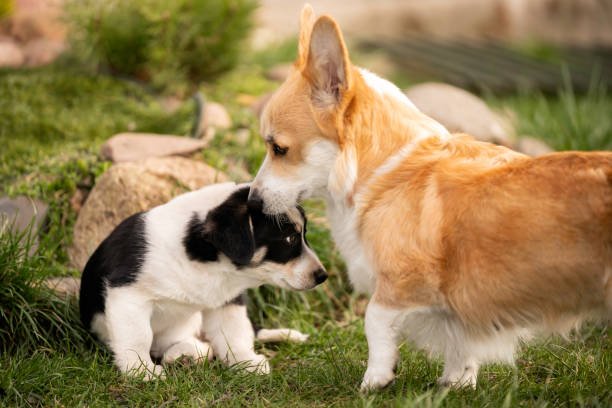
1. Herding Instinct
- Cardigan Welsh Corgis have a strong herding instinct. This may lead to nipping at heels, especially if they haven’t received proper training.
2. Stubbornness
- While intelligent, Cardigans can also be stubborn at times. Patience and consistent training methods are necessary to overcome this trait.
3. Barking
- Cardigans are known for their vocal nature and may bark frequently. This behavior can be managed with training and positive reinforcement.
4. Territorial
- Some Cardigans can be territorial, which may lead to aggressive behavior toward unfamiliar dogs or people if not properly socialized.
5. Separation Anxiety
- Cardigans form strong bonds with their owners and can develop separation anxiety if left alone for extended periods. Crate training and gradual departures can help alleviate this issue.
Managing and Addressing Behavioral Issues
Dealing with behavioral issues in Cardigan Welsh Corgis requires patience, consistency, and positive reinforcement. Here are some tips for managing and addressing common behavioral problems:
1. Herding Behavior
- Teach your dog alternative behaviors to herding, like “leave it” or “stay.” Engage in obedience training to redirect their instincts.
2. Stubbornness
- Be patient and use positive reinforcement to motivate your Cardigan. Consistency is key to overcoming stubborn tendencies.
3. Barking
- Address excessive barking through training and redirection. Provide mental stimulation to keep them occupied and less likely to bark out of boredom.
4. Territorial Behavior
- Socialize your Cardigan early and expose them to various people and dogs to reduce territorial tendencies. Supervise interactions with strangers.
5. Separation Anxiety
- Gradually desensitize your Cardigan to your departures by leaving for short periods and gradually extending the time apart. Provide engaging toys or puzzles for entertainment when you’re away.
In summary, understanding and addressing the behavioral traits of the Cardigan Welsh Corgi is essential for a harmonious and happy relationship between you and your furry companion. Positive reinforcement training, early socialization, and consistent management of challenging behaviors will help your Cardigan become a well-adjusted and well-behaved member of your family. If you encounter significant behavioral challenges, consider consulting a professional dog trainer or behaviorist for guidance and support.
10. Personal Stories and Testimonials
In this section, we’ll hear from real-life Cardigan Welsh Corgi owners who have graciously shared their experiences, challenges, and joys of having this remarkable breed as part of their lives. These personal anecdotes provide valuable insights into what it’s like to own a Cardigan and offer a human touch to the breed’s characteristics.
Cost of Owning a Cardigan Welsh Corgi
Owning a Cardigan Welsh Corgi comes with various expenses, including grooming, healthcare, and general care. Let’s explore the costs associated with these lovable dogs:
Grooming and Maintenance Costs
Testimonial from Sarah:
“I’ve had my Cardigan, Toby, for over five years now, and grooming has been a significant part of our expenses. Cardigans have a dense double coat that requires regular brushing to prevent mats and reduce shedding. I take Toby to a professional groomer every two to three months for a thorough trim and coat care. On average, grooming costs me around $50 to $70 per session. It’s an investment in his health and comfort, but it’s important to budget for it.”
Healthcare Expenses
Testimonial from Mark:
“Cardigan Welsh Corgis are generally healthy dogs, but like any breed, they can have specific health concerns. Regular veterinary check-ups are essential. I spend about $150 to $300 annually on routine vet visits, vaccinations, and preventive care. Additionally, I have pet insurance, which costs me around $30 to $50 per month. It provides peace of mind in case of unexpected medical expenses.”
Food and Supplies
Testimonial from Emily:
“Feeding my Cardigan, Cooper, high-quality dog food is a priority. I spend approximately $40 to $60 per month on his food, depending on the brand and size of the bag. Toys, treats, and other supplies like a sturdy leash, harness, and crate are additional costs to consider. Overall, I budget around $80 to $100 per month for food and supplies.”
Pros and Cons of Having a Cardigan Welsh Corgi as a Pet
Cardigan Welsh Corgis are charming and affectionate dogs, but like all breeds, they have their pros and cons. Let’s hear from owners about their experiences:
Pros of Having a Cardigan Welsh Corgi
Testimonial from Lisa:
“Cardigans are incredibly loyal and loving companions. They form strong bonds with their owners and are always there to offer comfort and support. Their intelligence makes them easy to train, and their herding instincts can be fascinating to observe. Plus, their unique appearance with those short legs and expressive faces is simply adorable!”
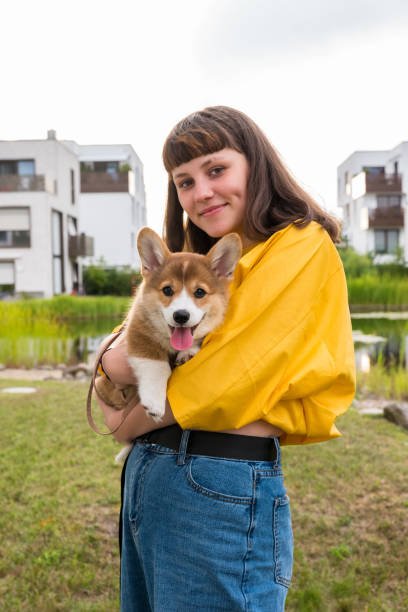
Testimonial from Michael:
“As a family with kids, we appreciate how gentle and patient our Cardigan, Daisy, is with our children. She’s protective without being aggressive and is always up for a game of fetch or a walk in the park. Cardigans are versatile dogs that can adapt to various living situations, whether you’re in an apartment or a house with a yard.”
Cons of Having a Cardigan Welsh Corgi
Testimonial from Karen:
“Cardigans can be quite vocal. They tend to bark to alert you to anything they find unusual, which can be challenging if you live in close quarters with neighbors who are sensitive to noise. It’s important to address this behavior through training and positive reinforcement.”
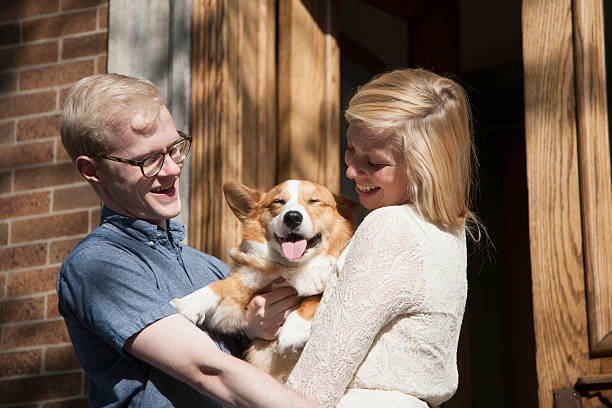
Testimonial from Jason:
“Their herding instincts are strong, and while it’s fascinating to watch them try to ‘herd’ the family, it can also be a challenge. They may try to nip at heels or attempt to control the movement of people or other pets. Proper training is essential to manage this behavior.”
In conclusion, owning a Cardigan Welsh Corgi can be a fulfilling and joyous experience, but it’s essential to be prepared for the associated costs, including grooming, healthcare, and general care. The insights shared by real-life Cardigan owners provide valuable information for those considering this breed as a pet.
As for the pros and cons, Cardigans are known for their loyalty, intelligence, and adaptability, making them fantastic family companions. However, their vocal nature and herding instincts may require extra attention and training. Ultimately, the decision to bring a Cardigan into your life should align with your lifestyle and your ability to provide the love and care these wonderful dogs deserve.
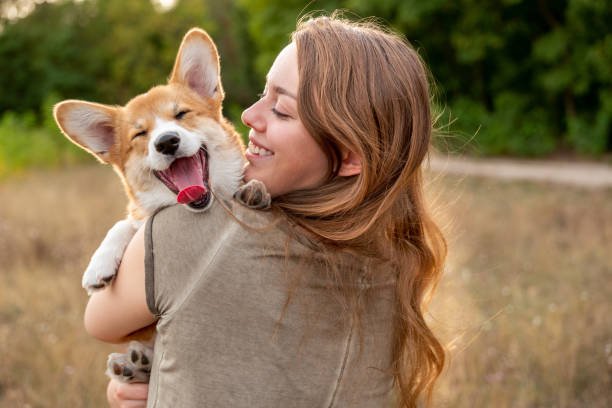
11. Breed-Specific Accessories and Care Products for Your Cardigan Welsh Corgi
Owning a Cardigan Welsh Corgi means having a loyal and spirited companion by your side. To ensure the well-being and happiness of your Corgi, it’s essential to invest in breed-specific accessories and care products that cater to their unique needs. In this section, we’ll recommend a range of items tailored to the Cardigan Welsh Corgi breed:
Grooming Tools
1. Undercoat Rake
- Cardigans have a double coat that can shed quite a bit, especially during seasonal changes. An undercoat rake is an excellent tool for removing loose fur and preventing matting.
2. Slicker Brush
- To keep your Corgi’s long and dense coat in top condition, a slicker brush helps remove tangles and mats, keeping the fur looking clean and healthy.
3. Nail Clippers
- Regular nail maintenance is crucial for your Cardigan’s comfort and overall well-being. Invest in a quality pair of nail clippers designed for dogs.
Harnesses and Collars
4. Front-Clip Harness
- Due to their herding instincts, Cardigans may pull on their leash. A front-clip harness helps redirect their attention and prevents excessive pulling.
5. Martingale Collar
- Martingale collars are ideal for Cardigans since they prevent them from slipping out of the collar, which is possible due to their short necks and long bodies.
Toys
6. Interactive Puzzle Toys
- Cardigans are intelligent dogs that thrive on mental stimulation. Interactive puzzle toys challenge their problem-solving skills and keep them engaged.
7. Fetch Toys
- Cardigans enjoy a game of fetch, so having a collection of durable fetch toys can provide hours of entertainment for your active pup.
Feeding and Water Bowls
8. Elevated Feeding Bowls
- Cardigans have short legs, and using elevated feeding bowls can make mealtime more comfortable and reduce the risk of bloat, a condition that can affect deep-chested breeds.
9. Slow-Feeder Bowl
- Some Cardigans may eat too quickly, which can lead to digestive issues. A slow-feeder bowl helps regulate their eating pace.
Bedding and Crates
10. Orthopedic Dog Bed
- Cardigans, like many breeds, benefit from an orthopedic dog bed, which provides extra support for their joints and spine.
11. Wire Dog Crate
- Crates are useful for housetraining and providing a safe space for your Corgi. A wire crate with a divider allows you to adjust the size as your dog grows.
Dental Care
12. Dental Chews and Toys
- Cardigans are prone to dental issues, so providing dental chews and toys can help keep their teeth clean and healthy.
Travel Accessories
13. Car Seat Belt
- If you plan to travel with your Cardigan, a car seat belt ensures their safety while riding in the car.
14. Travel Crate
- For longer trips, a travel crate provides a secure and familiar space for your Corgi, reducing travel stress.
Training Aids
15. Clicker Training Kit
- Clicker training is an effective way to teach your Cardigan commands and tricks. A clicker training kit includes the clicker and a guide to get you started.
Health and Wellness Products
16. Flea and Tick Prevention
- Depending on your region, you may need to protect your Cardigan from fleas and ticks. Consult with your vet for the best preventive options.
17. Joint Supplements
- To support joint health, especially as your Corgi ages, joint supplements can be beneficial. Discuss options with your veterinarian.
Grooming Products
18. Shampoo and Conditioner
- Invest in high-quality dog shampoo and conditioner to keep your Cardigan’s coat clean and healthy.
19. Ear Cleaner
- Cardigans have expressive ears, which can be prone to wax buildup. An ear cleaner designed for dogs helps maintain ear health.
Cleaning Supplies
20. Stain and Odor Remover
- Accidents happen, especially during puppyhood. Having a reliable stain and odor remover on hand is a must for easy clean-up.
When selecting these accessories and care products for your Cardigan Welsh Corgi, remember to consider their individual needs and preferences. Additionally, consult with your veterinarian for specific recommendations based on your dog’s health and age. By providing the right tools and products, you’ll ensure that your Corgi enjoys a happy, healthy, and fulfilling life as a cherished member of your family.
12. Frequently Asked Questions (FAQs) about Cardigan Welsh Corgis
As we’ve explored various aspects of the Cardigan Welsh Corgi breed, you might still have some lingering questions. In this FAQ section, we’ll address ten common questions about Cardigan Welsh Corgis, covering topics that may not have been discussed in the previous sections.
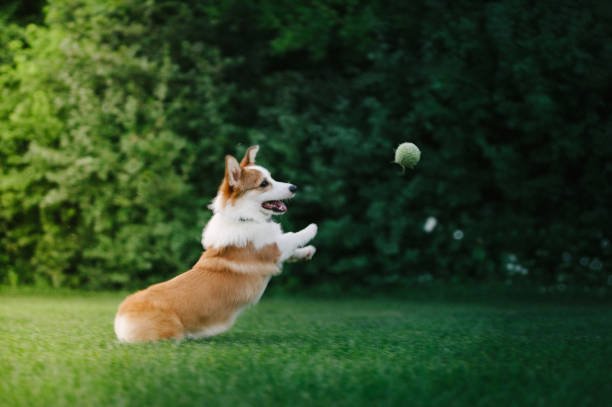
1. Are Cardigan Welsh Corgis hypoallergenic?
No, Cardigan Welsh Corgis are not hypoallergenic. They shed their dense double coat throughout the year, which can trigger allergies in some individuals. Regular grooming and cleaning can help reduce allergen exposure, but they are not considered a hypoallergenic breed.
2. Do Cardigan Welsh Corgis get along with other pets?
Yes, Cardigan Welsh Corgis are generally good with other pets, including cats and other dogs, especially if they are socialized from a young age. Their friendly and adaptable nature makes them compatible with a variety of animals.
3. How much exercise do Cardigan Welsh Corgis need?
Cardigan Welsh Corgis are an active breed and require daily exercise to stay healthy and happy. Aim for at least 30 to 45 minutes of brisk walking each day, along with playtime and mental stimulation. Their exercise needs may vary based on age and individual energy levels.
4. Are Cardigan Welsh Corgis prone to obesity?
Yes, Cardigan Welsh Corgis can be prone to obesity if not properly managed. They have a tendency to gain weight, so it’s essential to provide them with a balanced diet and regular exercise. Be cautious not to overfeed or offer too many treats.
5. Are Cardigan Welsh Corgis good family dogs?
Yes, Cardigan Welsh Corgis are excellent family dogs. They are known for their loyalty and gentle nature, making them great companions for families with children. However, it’s important to supervise interactions with young children to ensure both the child and the dog’s safety.
6. Can Cardigan Welsh Corgis live in apartments?
Yes, Cardigan Welsh Corgis can adapt to apartment living if their exercise and mental stimulation needs are met. However, they will require daily walks and playtime to stay happy and healthy. Having access to a nearby park or green space is beneficial.
7. What health issues are common in Cardigan Welsh Corgis?
Cardigan Welsh Corgis are generally healthy dogs, but they can be prone to certain health issues, including hip dysplasia, progressive retinal atrophy (PRA), and degenerative myelopathy. Regular veterinary check-ups are essential to catch and manage these conditions early.
8. Do Cardigan Welsh Corgis make good watchdogs?
Yes, Cardigan Welsh Corgis make excellent watchdogs. They are alert and have a natural instinct to protect their family. They will bark to alert you to any potential threats or unusual activity.
9. Are Cardigan Welsh Corgis easy to train?
Yes, Cardigan Welsh Corgis are generally easy to train due to their high intelligence and eagerness to please. Positive reinforcement methods work well with this breed. However, they can also be a bit stubborn, so consistency and patience are key.
10. Do Cardigan Welsh Corgis require a lot of grooming?
Yes, Cardigan Welsh Corgis have a dense double coat that requires regular grooming. They shed throughout the year, with heavier shedding during seasonal changes. Brushing their coat several times a week helps reduce shedding and prevents matting. Additionally, occasional professional grooming may be necessary to maintain their coat’s health.
These FAQs cover some of the common questions about Cardigan Welsh Corgis, addressing important aspects of their care, behavior, and suitability as family pets. Always consult with a reputable breeder or veterinarian for personalized guidance and additional information about this wonderful breed.
13. Conclusion
In this comprehensive guide, we’ve delved into the world of the Cardigan Welsh Corgi breed, exploring their unique characteristics, care requirements, and what it takes to be a responsible owner. As we conclude, let’s recap the key points, emphasize responsible ownership, and encourage the consideration of adoption for this remarkable breed.
Summary of Key Points
- Cardigan Welsh Corgis are a distinctive and charming breed known for their short legs, long bodies, and expressive faces.
- They are intelligent, loyal, and good with families, making them excellent companions.
- Cardigans have specific exercise and grooming needs that owners must meet to keep them happy and healthy.
- While generally healthy, they can be prone to certain health issues, so regular veterinary care is essential.
- Training and socialization are crucial for Cardigan Welsh Corgis to ensure they develop into well-behaved pets.
- Responsible ownership involves providing proper care, including grooming, exercise, and a balanced diet, as well as addressing any behavioral issues.
- Adoption is a meaningful way to bring a Cardigan into your life, offering a second chance to a deserving dog.
Responsible Ownership
Being a responsible owner of a Cardigan Welsh Corgi goes beyond providing food and shelter. It involves:
1. Proper Care: Committing to meeting the breed’s exercise, grooming, and healthcare needs to ensure their well-being.
2. Training and Socialization: Enrolling in obedience classes and exposing your Cardigan to various people, animals, and situations.
3. Regular Veterinary Care: Scheduling routine check-ups and vaccinations, and addressing any health concerns promptly.
4. Grooming: Brushing your Cardigan’s coat regularly, cleaning ears and teeth, and addressing shedding and matting issues.
5. Exercise and Mental Stimulation: Providing daily exercise and engaging activities to keep their minds sharp and bodies fit.
6. Responsible Breeding: If you choose to purchase from a breeder, ensure they follow responsible breeding practices, including health screenings and genetic diversity.
7. Proper Diet: Feeding a balanced diet suitable for your Cardigan’s age, size, and activity level.
8. Behavioral Training: Using positive reinforcement methods and addressing any behavioral issues with patience and consistency.
Encouraging Adoption
While purchasing a Cardigan Welsh Corgi from a breeder is an option, we strongly encourage considering adoption as an alternative. Many Cardigans in need of loving homes are available for adoption through breed-specific rescues and shelters. Here are some reasons to consider adoption:
1. Give a Dog a Second Chance: By adopting, you provide a loving home to a dog in need, offering them a fresh start in life.
2. Rescue Dogs Are Grateful: Many rescued Cardigans are incredibly appreciative of their new families and form deep bonds.
3. Support Ethical Practices: Adoption supports ethical treatment of animals and promotes responsible pet ownership.
4. Variety of Ages: Rescue organizations often have Cardigans of various ages, allowing you to choose a dog that suits your lifestyle.
5. Resources for Adoption: Numerous resources are available for those interested in Cardigan Welsh Corgi adoption, including breed-specific rescue organizations and shelters.
Remember that responsible ownership extends to adopted dogs as well. Offering a loving and caring home to a rescue Cardigan is a rewarding experience, and your support contributes to the welfare of these wonderful dogs.
In conclusion, the Cardigan Welsh Corgi is a captivating breed that brings joy and companionship to countless families. Whether you choose to purchase from a breeder or adopt from a rescue, being a responsible owner means providing the love, care, and attention these dogs deserve. By following the guidelines outlined in this guide, you’ll be well-prepared to embark on a fulfilling journey with your Cardigan Welsh Corgi, creating lasting memories and cherished moments together.
























